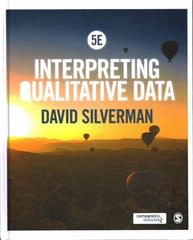Question
You gave a great example of a source of bias and confounding variables in a study. Yes, I believe, researchers need to recognize confounding variables
You gave a great example of a source of bias and confounding variables in a study.
Yes, I believe, researchers need to recognize confounding variables in their studies, because failing to recognizethem, can lead to inaccurate or misleading results(Goodwin & Goodwin, 2017).
For example, suppose a researcher is studying the effect of a new medication on Alzheimer's disease outcome but fails to recognize that age and heritability are confounding variables that affect both the medication and the health outcome (Scheltens, P. et al., 2021). In that case, the results may be misleading. This is because the researcher may mistakenly conclude that the medication affects the health outcome when it is the participants' age and heritability that are driving the relationship.
Failing to recognize confounding variables can also lead to a lack of reproducibility of the study's results and a waste of time and resources (Goodwin & Goodwin, 2017). Therefore, it is crucial for researchers to carefully consider and control for confounding variables in their studies to ensure accurate and meaningful results(Goodwin & Goodwin, 2017).
References:
Step by Step Solution
There are 3 Steps involved in it
Step: 1

Get Instant Access to Expert-Tailored Solutions
See step-by-step solutions with expert insights and AI powered tools for academic success
Step: 2

Step: 3

Ace Your Homework with AI
Get the answers you need in no time with our AI-driven, step-by-step assistance
Get Started


